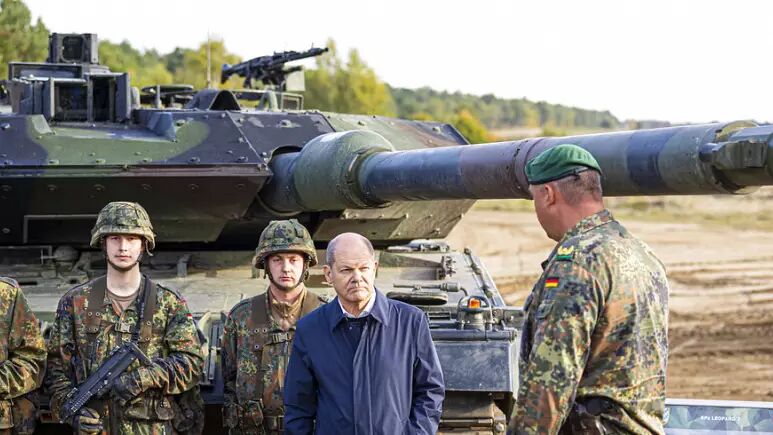Mehdi Shapouri, in an interview with the website of the Strategic Council on Foreign Relations, referred to the concerns expressed by some officials of European countries regarding the consequences of sending heavy weapons to Ukraine and Russia’s threats for the possibility of using nuclear weapons, and stated: The West believes that if Russia wins the Ukraine war it will be unstoppable and will endanger the security architecture of Europe and the West as well as the world order with its advances. In addition, intensification of support for Ukraine happened after Russia’s attacks on civilian infrastructure in Ukraine. Russia’s objective was to force Ukraine to surrender sooner, but it was predictable that the West would also try to send advanced weapons and by adopting this tactic, do not allow Russia to get concessions from Ukraine in this way.
Referring to the large amount of weapons sent by Britain to Ukraine and the dispatch of 14 Challenger 2 battle tanks, he added: Britain and Eastern Europe exerted a lot of pressure to convince Germany to send Leopard tanks to Ukraine, and finally with the new US approval for sending heavy weapons put further pressure on Germany. The pressure on Germany was successful and the German government decided to send a group of Leopard 2E6-tank to Ukraine.
The researcher of the Institute of Strategic Studies explained the positions of the internal opponents of the German government and the warnings that the country is being dragged into a direct war with Russia and said: Prolonging the war now is not in the interest of Ukraine and the West. Ukraine’s resilience in the war of attrition is lower than that of Russia, and so far it has lost many of its military and civilian infrastructures, capabilities and potentials.
He stated that probably the West will give more advanced weapons to Ukraine in the future and it will not last too long before they send F-16 fighters to them and train them to use those fighters, adding: Ukraine’s use of those weapons in the battlefield can deal a heavy blow to Russia. Ukraine may attack in the spring, or if Russia does attack, it may retaliate well. New weapons, tanks and personnel carriers are among the most advanced armor and anti-armor systems in the world. In addition, as a result of the last 11 months of war, Russia’s military power has weakened and Russian equipment, tanks and personnel carriers are not that much capable of dealing with this new equipment.
The expert on international affairs pointed to the recent problems of Russia in the field of using the air force and increasing the probability of being targeted by fighters and noted: Since the beginning of the war, Russia could not dominate the sky of Ukraine in order to be able to achieve a suitable advanced on the ground, now this problem has become more difficult and it seems that the balance in the war will change to the detriment of Russia.
Referring to the remarks of the deputy of the Russian Duma who considered the delivery of German tanks to Ukraine as a hostile and military action and said that such action gives their army the right to use much stronger weapons in special operations that even the enemy is not aware of, he added: In this regard, there have been threats regarding the use of nuclear weapons, but still none of the countries consider it very serious and there is no concern about it.
However, he did not consider the possibility of Russia’s use of nuclear weapons as high and added: The use of such weapon by a nuclear power does not mean that it can necessarily gain a superior position in the war. The nuclear powers have had several failures so far and have not used this weapon. In addition, if Russia uses nuclear weapons in Ukraine, NATO may also decide to retaliate as soon as Russia starts the slightest move in this direction and with a preemptive action destroys its military infrastructure.
Referring to the news published by the media about the decision of the United States to help Ukraine to retake Crimea and to send advanced weapons with an aim of being used in such possible battle, the researcher of the Institute of Strategic Studies reminded: The West insists that Russia should not be the winner in Ukraine. Currently, such an objective is being pursued through various methods, including the use of diplomacy, war of attrition and raising the costs of war compared to the achievements, failure in the military arena, surprise action in the field, and the discussion of Russia’s failure also seems serious.
Further, while explaining the different positions of Germany and France regarding the way the West is dealing with Russia, he added: Paris and Berlin are not in favor of intensifying the policies applied against Russia and its humiliation and defeat. They believe that the defeat of Russia has consequences and may endanger the security of Europe; but Eastern Europe, due to historical fear of Russia, is against leniency towards Russia, and the US and England also agreed with them. After Russia’s attack on Ukraine, they increased their support for Ukraine, especially Germany took a strong position and sent weapons to Ukraine.
Shapouri explained: Eastern Europe and the United States were not against France and Germany’s negotiations with Russia before the start of the war, and after the war they wanted those two countries to admit the failure of their policies towards Russia, and this happened. Moscow refused to proceed through diplomacy as expected by France and Germany. Now France and Germany also feel threatened by Russia. Considering the sensitivity and pressure of Western public opinion towards Russia, those governments also want to show that they are not far from others in supporting Ukraine.










0 Comments